 W
WAgainst Their Will... The History and Geography of Forced Migrations in the USSR is a historical research book by Pavel Polyan, published by the Memorial society. It is the first comprehensive study of all massive-scale forced migrations within the Soviet Union. The book is based on published materials and archival data made public. It contains a large number of summary tables.
 W
WThe Art of Not Being Governed: An Anarchist History of Upland Southeast Asia is a book-length anthropological and historical study of the Zomia highlands of Southeast Asia written by James C. Scott published in 2009. Zomia, as defined by Scott, includes all the lands at elevations above 300 meters stretching from the Central Highlands of Vietnam to Northeastern India. That encompasses parts of Vietnam, Cambodia, Laos, Thailand, and Myanmar, as well as four provinces of China. Zomia's 100 million residents are minority peoples "of truly bewildering ethnic and linguistic variety", he writes. Among them are the Akha, Hmong, Karen, Lahu, Mien, and Wa peoples.
 W
WThe Bells of Nagasaki is a 1949 book by Takashi Nagai. It vividly describes his experiences as a survivor of the atomic bombing of Nagasaki. It was translated into English by William Johnston. The title refers to the bells of Urakami Cathedral, of which Nagai writes:
 W
WBenevolent Assimilation: The American Conquest of the Philippines, 1899-1903 is a non-fiction book documenting the history of the Philippine–American War by Stuart Creighton Miller (1927–2010), a professor at San Francisco State University, published in 1982 by Yale University Press. The title refers to U.S. President William McKinley's "Benevolent Assimilation" proclamation of December 21, 1898, which used that term to characterize the U.S. occupation and administration of the entire group of the Philippine Islands, then in its early stages following the cession of sovereignty by Spain to the U.S. in the 1898 Treaty of Paris.
 W
WBrunei and Malaysia: Why Sultan Omar Ali Saifuddin Refused to Join the Federation is a 2013 book written by Isa Bin Ibrahim, a prominent member of the delegation of Sultan Omar Ali Saifuddin of Brunei with Neil Lawson QC, a London lawyer acting as the constitutional adviser on the formation of Malaysia. The book offers an inside perspective on Brunei's determination to retain its territory as an oil-rich self-governing state, contrasted with the British desire that Brunei should become part of the new federation to help counter the regional influence of China.
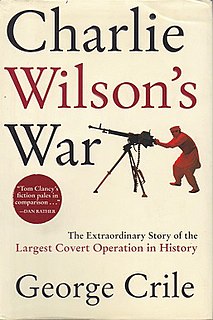 W
WCharlie Wilson's War: The Extraordinary Story of the Largest Covert Operation in History was a 2003 book by George Crile III. It detailed U.S. Representative Charlie Wilson's role in providing assistance to the Afghan Mujahideen during the Soviet–Afghan War. It was adapted into the 2007 Mike Nichols film Charlie Wilson's War, in which Wilson was portrayed by Tom Hanks.
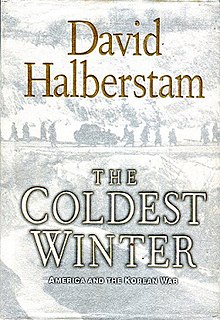 W
WThe Coldest Winter: America and the Korean War is a non-fiction book by the author David Halberstam. It was published posthumously in 2007, after his sudden death in a traffic collision at the age of 73.
 W
WCreating "Greater Malaysia": Decolonization and the Politics of Merger is a 2008 book written by Tan Tai Yong that contrasts the relative ease with which two of the states of Borneo Territories, namely North Borneo and Sarawak, entered the Federation of Malaysia, with the complicated negotiations and hard bargaining between the other Borneo state of Brunei and the Singapore on the one hand and the Federation of Malaya on the other concerning the critical issues of citizenship, control of finances and the development of a common market during the formation of Malaysia.
 W
WCrisis: The Japanese Attack on Pearl Harbor and Southeast Asia is a 1992 book written by Allan Beekman, who also wrote The Niihau Incident and Hawaiian Tales. Crisis organizes into a coherent whole the elements that coalesced into the tragedy of Pearl Harbor.
 W
WThe Cruel Birth of Bangladesh: Memoirs of an American Diplomat, is American Diplomat Archer Blood's account of the emergence of Bangladesh, published by University Press Limited in 2002. After the State Department declassified the documents, telegrams and other messages relating to this period, Blood wrote 24 chapters describing the events of 1971 as he and the staff of the United States Mission in Dhaka witnessed.
 W
WCurse on This Country: The Rebellious Army of Imperial Japan is a 2016 history book by Danny Orbach, a professor at Hebrew University in Jerusalem. It deals with a variety of rebellions by the Imperial military though the 19th and early 20th century. It argues that a culture of disobedience and rebellion existed in the Japanese army, deriving from the tradition of the shishi, rebellious samurai active in the 1860s. It preserved itself and expanded over decades, due to political conditions, historical circumstances and the institutional development of the Imperial Japanese Army. It was fed by enduring leniency to right-wing rebels as long as their motives were "pure".
 W
WDilemma in Japan is a non-fiction book written by Andrew Roth during World War II, and it was first published in the United States in September 1945. In Dilemma In Japan, Andrew Roth warns of the threat of the Zaibatsu, and so-called "moderates" to post-war Japan. Roth describes how the Occupation should treat Hirohito, and cites Hirohito's war responsibility, and the need for him to be put on trial as a war criminal.
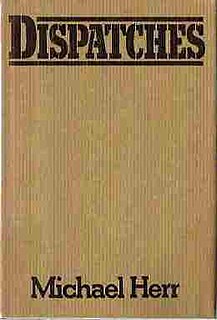 W
WDispatches is a New Journalism book by Michael Herr that describes the author's experiences in Vietnam as a war correspondent for Esquire magazine. First published in 1977, Dispatches was one of the first pieces of American literature that portrayed the experiences of soldiers in the Vietnam War for American readers.
 W
WThe Economic Organization of War Communism, 1918—1921, is a history book by Silvana Malle about economics of Soviet Russia during war communism time.
 W
WEmbers of War: The Fall of an Empire and the Making of America's Vietnam is a 2012 book by the Cornell University historian Fredrik Logevall, which won the 2013 Pulitzer Prize for History. It also won the inaugural American Library in Paris Book Award and the 2013 Arthur Ross Book Award and was a runner-up for the Cundill Prize. The book covers the Vietnam conflict right from the 1919 Versailles Peace Conference till 1959 when the first Americans soldiers are killed in an ambush near Saigon in Vietnam, focusing on the Indochina War between France and the Viet Minh.
 W
WEmbracing Defeat: Japan in the Wake of World War II is a history book written by John W. Dower and published by W. W. Norton & Company in 1999. The book covers the difficult social, economic, cultural and political situation of Japan after World War II and the Occupation of Japan by the Allies between August 1945 and April 1952, delving into topics such as the administration of Douglas MacArthur, the Tokyo war crimes trials, Hirohito's controversial Humanity Declaration and the drafting of the new Constitution of Japan.
 W
WFatalism and Development: Nepal's Struggle for Modernization is the most notable book about the local socio-cultural issues of Nepalese people. It is written by the renowned and most controversial anthropologist of Nepal, Dor Bahadur Bista.
 W
WThe Forever War is a non-fiction book by American journalist Dexter Filkins about his observations on assignment in Afghanistan and Iraq during the 2001 War in Afghanistan and the Iraq War.
 W
WThe Glass Palace Chronicle of the kings of Burma is the only English language translation of the first portions of Hmannan Yazawin, the standard chronicle of Konbaung Dynasty of Burma (Myanmar). Hmannan was translated into English by Pe Maung Tin and Gordon H Luce in 1923, who gave it its English name.
 W
WThe Great Gamble: The Soviet War in Afghanistan is a 2009 book by Gregory Feifer about the 1979-1989 Soviet–Afghan War.
 W
WGulag: A History, also published as Gulag: A History of the Soviet Camps, is a non-fiction book covering the history of the Soviet Gulag system. It was written by American author Anne Applebaum and published in 2003 by Doubleday. Gulag won the 2004 Pulitzer Prize for General Non-Fiction and the 2004 Duff Cooper Prize. It was also nominated for the National Book Critics Circle prize and for the National Book Award.
 W
WHell to Pay: Operation Downfall and the Invasion of Japan, 1945-1947 is a book by Dennis Giangreco. It is about Operation Downfall, the proposed invasion of Imperial Japan during World War II.
 W
WHellfire: The Story of Australia, Japan and the Prisoners of War is a history book written by Australian journalist and author Cameron Forbes published by Macmillan Publishers in 2005. It tells the stories of Australian prisoners of war of the Japanese during the Second World War, with particular focus on the Burma Railway.
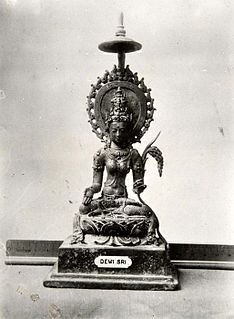 W
WHikayat Raja-raja Pasai is perhaps the earliest work in Malay on the first Malay-Muslim kingdom of Samudera-Pasai. In the story, Merah Silu met Muhammad in his dream and accepted conversion to Islam. The book is believed to be a creation of 14th century, according to Dr. Russell Jones.
 W
WHirohito and the Making of Modern Japan is a book by Herbert P. Bix covering the reign of Emperor Hirohito of Japan from 1926 until his death in 1989. It won the 2001 Pulitzer Prize for General Non-Fiction.
 W
WHistory of Java is a book written by Sir Thomas Stamford Raffles, and published in 1817. It describes the history of the island of Java from ancient times. It was reprinted from a digital master by the Cambridge University Press in 2010.
 W
WIn Our Image: America's Empire in the Philippines is a 1989 book by American journalist Stanley Karnow, published by Random House. The book details the Philippine–American War (1899–1902) and the subsequent American occupation of the islands. Karnow described the book as "the story of America's only major colonial experience. How did we perform? What did we do there? What have we left there?" Karnow made six trips to the Philippines for research while writing the book, and also drew heavily on archives.
 W
WIn the Presence of Mine Enemies: 1965–1973 – A Prisoner of War is a memoir by American pilot Howard E. Rutledge, co-written with his wife and Mel and Lyla White, of his time in a Vietnamese POW camp during the Vietnam War. When it was published it was the first book-length firsthand treatment of the experiences of American prisoners of war in Vietnam. It was made into a documentary in the same year.
 W
WInto the Mouth of the Cat: The Story of Lance Sijan, Hero of Vietnam is a book written by Malcolm McConnell and copyrighted in 1985 by Norton publishers.
 W
WJawbreaker: The Attack on Bin Laden and Al-Qaeda: A Personal Account by the CIA's Key Field Commander (2005) is an autobiographical book by CIA agent Gary Berntsen describing the time he spent in Afghanistan at the beginning of the American campaign against the Taliban, al-Qaeda and Osama bin Laden after the September 11, 2001 attacks.
 W
WThe Kamikaze Hunters: Fighting for the Pacific, 1945 is a 2015 book by Will Iredale. It deals with the actions of the Fleet Air Arm of Great Britain's Royal Navy during 1945, in the final stages of World War II in the Pacific theater.
 W
WKhalangama Hamala is the war memoir of a health worker written during the Maoist insurgency at Jumla, Nepal. It won the Madan Puraskar recently which is the most recognized literary award in Nepal. The book is written by Radha Paudel.
 W
WThe Khâm định Việt sử Thông giám cương mục was a history of Vietnam commissioned by the emperor Tự Đức of the Nguyễn dynasty. It was written in Classical Chinese.
 W
WKorea, A Walk Through the Land of Miracles (ISBN 0-06-075044-8) is a book by Simon Winchester. He recounts his experience walking across South Korea, from Jeju in the south to the DMZ in the north, roughly following a route originally taken by a group of Dutch sailors, reportedly the first Europeans to visit Korea. The book makes general observations about Korean society and culture along with recounting the most memorable encounters on the trip. He originally wrote the book in the mid-late 1980s, publishing it in 1988, during the final years of the military dictatorship that ruled the South Korea during the Fifth Republic. Winchester visited Gwangju only a few years after the Gwangju massacre, an event which marked dissatisfaction with the government.
 W
WKrakatoa: The Day the World Exploded is a 2003 book by Simon Winchester covering the 1883 eruption of Krakatoa.
 W
WLenin's Tomb: The Last Days of the Soviet Empire is a book by American author David Remnick. Often cited as an example of New Journalism, it won the Pulitzer Prize for General Non-Fiction in 1994.
 W
WLethal Politics: Soviet Genocide and Mass Murder since 1917 is a book by Rudolph Rummel, published by Transaction Publishers in 1990. The book examines genocides and mass murders perpetrated by the Soviet regime from the days of Vladimir Lenin until the last years of the Cold War, with an emphasis on the Joseph Stalin regime.
 W
WMidnight's Furies: The Deadly Legacy of India's Partition is a non-fiction book by Nisid Hajari, published in 2015 by Houghton Mifflin Harcourt. The book chronicles the partition of India and the riots and other violence that followed. It was the 2016 recipient of the Colby Award.
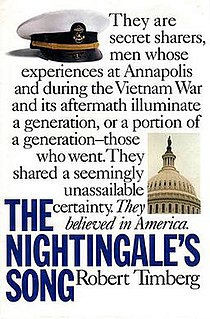 W
WThe Nightingale's Song is a 1995 book by Baltimore Sun journalist Robert Timberg. It relates the military and political careers of five graduates of the United States Naval Academy, most of whom served during the Vietnam War in either the United States Navy or United States Marine Corps: John McCain, Bud McFarlane, Oliver North, John Poindexter, and Jim Webb. Timberg himself was also a Naval Academy graduate and served in Vietnam with the Marine Corps, where he was badly wounded.
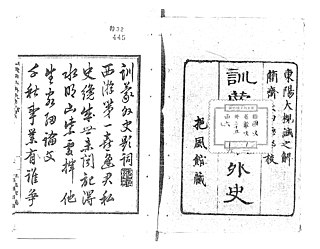 W
WThe Nihon Gaishi (日本外史) is a 19th-century book on the history of Japan by Rai San'yo. The whole work comprises 22 scrolls.
 W
WThe Philippine Islands, 1493–1898, often referred to as Blair and Robertson after its two authors, was a 55-volume series of Philippine historical documents. They were translated by Emma Helen Blair and James Alexander Robertson, a director of the National Library of the Philippines from 1910 to 1916.
 W
WPlatoon Leader is a memoir by James R. McDonough. It is narrated by McDonough in first person view and tells of his story in the Vietnam War as a lieutenant in command of 2nd Platoon, Bravo Company, 4th Battalion, 503rd Infantry(Airborne).
 W
WRizal Without the Overcoat is a book by Filipino writer Ambeth Ocampo, adapted from his "Looking Back" column in the Philippine Daily Globe from October 1987 to July 1990. These writings were attempts to "translate" José Rizal and his historical context so that he could be better understood by a new generation—to present "a "new" Rizal that had been obscured by school and myth."
 W
WSamurai! is a 1957 autobiographical book by Saburo Sakai co-written with Fred Saito and Martin Caidin. It describes the life and career of Saburō Sakai, the Japanese combat aviator who fought against American fighter pilots in the Pacific Theater of World War II, surviving the war with 64 kills as one of Japan's leading flying aces. Caidin wrote the prose of the book, basing its contents on journalist Fred Saito's extensive interviews with Sakai as well as on Sakai's own memoirs.
 W
WThe Shoku Nihongi (続日本紀) is an imperially-commissioned Japanese history text. Completed in 797, it is the second of the Six National Histories, coming directly after the Nihon Shoki and followed by Nihon Kōki. Fujiwara no Tsugutada and Sugano no Mamichi served as the primary editors. It is one of the most important primary historical sources for information about Japan's Nara period.
 W
WSong of Ariran is a book of reportage by an American journalist, Helen Foster Snow under the name Nym Wales. Snow traveled to Yan'an, the wartime capital of the Chinese Communist Party, which welcomed and supported many Koreans in the fight for independence from Japan. The colorful and personal information on the history of the Korean independence movement and the Chinese Communist movement in the 1930s is based on extensive interviews with a Korean communist Jang Jirak who is called Kim San in the book.
 W
WSri Lanka's Secrets: How the Rajapaksa Regime Gets Away with Murder is a 2014 book written by Australian writer, veteran journalist and activist Trevor Grant, examining the various forms of genocide perpetuated on Tamil people by the Sri Lankan government and the complicity of international establishments.
 W
WStalin: The Court of the Red Tsar is a 2003 history book by Simon Sebag Montefiore. It primarily deals with the lives of Soviet dictator Joseph Stalin and those around him from the late 1920s through to his death in 1953, covering the period of collectivization, the Moscow show trials, the purges, World War II and the beginning of the Cold War.
 W
WStill Counting the Dead: Survivors of Sri Lanka's Hidden War is a book written by the British journalist Frances Harrison, a former BBC correspondent in Sri Lanka and former Amnesty Head of news. The book deals with thousands of Sri Lankan Tamil civilians who were killed, caught in the crossfire during the war. This and the government's strict media blackout would leave the world unaware of their suffering in the final stages of the Sri Lankan Civil War. The books also highlights the failure of the United Nations, whose staff left before the final offensive started.
 W
WThe Tang thương ngẫu lục is a Chinese-language work by Vietnamese Confucian scholars Phạm Đình Hổ and Nguyễn Án. The work documents religious and social events of 18th-century Vietnam.
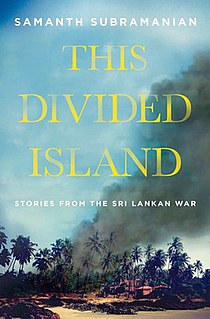 W
WThis Divided Island: Life, Death, and the Sri Lankan War is a book by Indian author and journalist, Samanth Subramanian, written as a non fiction account of the Sri Lankan Civil War.
 W
WTokyo Vice: An American Reporter on the Police Beat in Japan is a 2009 memoir by Jake Adelstein of his years living in Tokyo as the first non-Japanese reporter working for one of Japan's largest newspapers, Yomiuri Shinbun. It was published by Random House and Pantheon Books. HBO is adapting the memoir into a television series.
 W
WTuhfat al-Nafis is a work of Malay literature written by Raja Ali Haji in Jawi in around 1866-70. who is of Malay-Bugis descent. It records and chronicles events, especially those of the 19th century, that occurred in several Malay states. Some of the events recorded in the work include the founding of the state of Terengganu and the murder of Sultan Mahmud Shah II of Johor. Tuhfat al-Nafis means "the precious gift" in the Arabic language.
 W
WWinged Samurai: Saburo Sakai and the Zero Fighter Pilots is a 1985 book by Henry Sakaida dealing with the wartime history of Saburō Sakai and other Imperial Japanese Navy Air Service pilots who flew the Mitsubishi A6M Zero. It was published by Champlin Fighter Museum Press.
 W
WThe Wrong Enemy: America in Afghanistan, 2001–2014 is a 2014 book by Carlotta Gall. In the book, she argues that the United States and its allies have been focused on stopping the terrorist activities of al-Qaeda and its Taliban supporters in Afghanistan, but that focus should instead have been on antagonistic forces in Pakistan. Her reasoning is that the Taliban exists and Osama bin Laden was able to survive for so long because Pakistan's corrupt government and the people at the Inter-Services Intelligence, Pakistan's clandestine security service, provide aid to these terrorists.